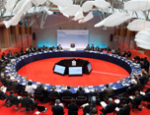Participants at the Petersberg Climate Dialogue II, held under the theme "Rising to the Climate Challenge," acknowledged the successful outcome of the Cancun Climate Change Conference and agreed to build on its success and the trust it created, while noting that the level of ambition of existing commitments and actions is insufficient to limit the global temperature increase to below 2ºC.
 4 July 2011: Ministers and high-ranking representatives from 35 countries met at the Petersberg Climate Dialogue II, under the theme “Rising to the Climate Challenge.” The event was convened at the invitation of German Environment Minister Norbert Röttgen and South African Minister of International Relations Maite Nkoana-Mashabane to discuss possible ways forward in the UN climate change negotiations.
4 July 2011: Ministers and high-ranking representatives from 35 countries met at the Petersberg Climate Dialogue II, under the theme “Rising to the Climate Challenge.” The event was convened at the invitation of German Environment Minister Norbert Röttgen and South African Minister of International Relations Maite Nkoana-Mashabane to discuss possible ways forward in the UN climate change negotiations.
The meeting, which took place from 3-4 July 2011 in Berlin, Germany, included the Chairs of the Ad Hoc Working Group on Long-term Cooperative Action under the Convention (AWG-LCA), the Ad Hoc Working Group on Further Commitments for Annex I Parties under the Kyoto Protocol (AWG-KP) and the Subsidiary Body for Scientific and Technical Advice (SBSTA), as well as Christiana Figueres, UNFCCC Deputy Executive-Secretary.
According to the Co-Chairs’ summary prepared by Röttgen and Nkoana-Mashabane, ministers acknowledged the successful outcome of the Cancun Climate Change Conference and agreed to build on its success and the trust it created, while noting that the level of ambition of existing commitments and actions is insufficient to limit the global temperature increase to below 2ºC.
Ministers also recognized that the incremental approach adopted since the Copenhagen Climate Change Conference has been successful and should be continued, emphasizing that the Durban Climate Change Conference should address outstanding issues and operationalize the Cancun decisions. they further identified key political issues under negotiation that needed to be dealt with before, during and after Durban, including the legal form, the second commitment period under the Kyoto Protocol, equity, and the level of ambition of mitigation pledges.
Ministers further proposed that Durban give political direction to the shape of, and timing for, a future comprehensive, global rules-based system that ensures global warming stays below 2 or 1.5ºC, noting the need for further discussion in the run up to Durban and beyond on how to address equity in the negotiations.
Ministers stressed the need to: avoid a financing gap after 2012, when the fast-start finance period ends; meet the long-term financing goal of US$100 billion per year by 2020; ensure meaningful mitigation action and transparency on implementation; and explore further sources for long-term financing. They agreed that Durban should take a decision to operationalize the Green Climate Fund, which should play a catalytic role in assisting developing countries in their efforts to pursue transformational low-carbon and climate-resilient development paths.
In addition, ministers discussed Durban outcome scenarios, noting the need to further discuss a transitional phase and middle-ground options. As elements for a possible Durban outcome, ministers identified, inter alia: the operationalization of the Cancun outcomes; a transitional solution to ensure the continuation of a rules-based system, equal emphasis of mitigation and adaptation, transparency and finance; and progress on pending issues.
At the closing, Minister Nkoana-Mashabane’s outlined the elements of a way forward according to the Presidency of the forthcoming Durban Climate Change Conference as: the consolidation of trust rekindled at the Cancun Climate Change Conference, as well as the belief restored in the UNFCCC multilateral process; the operationalization of the Cancun decisions; and dealing with unfinished business from the Bali Road Map and Action Plan.
The first Petersberg Climate Dialogue took place in May 2010 in Petersberg, near Bonn, Germany. The process began as a political initiative by German Chancellor Angela Merkel in 2009 at the Copenhagen Climate Change Conference, to comprehensively support and advance the international climate negotiations bridging the gap between “implementation and negotiation.” [BMU Press Release] [Co-Chairs’ Summary] [Minister Nkoana-Mashabane’s Statement]